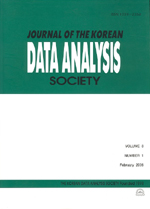청소년의 인터넷 중독에 따른 자기효능감과 건강증진행위의 차이
Difference of Self-Efficacy and Health Promoting Behavior According to the Existence Internet Addiction in Adolescents
- 한국자료분석학회
- Journal of The Korean Data Analysis Society (JKDAS)
- Vol.10 No.6
-
2008.123121 - 3132 (12 pages)
- 13

본 연구는 청소년의 인터넷 중독에 따른 자기효능감과 건강증진행위에 대한 차이를 규명하고자 시도하였다. 2005년 3월 20일부터 3월 30일까지 U시의 남자 중학생 338명을 대상으로, 연구도구는 인터넷 중독 검사, 자기효능감, 건강증진행위를 사용하였다. 본 연구 대상자 중 18.3%가 인터넷 중독군으로 나타났고, 중독군과 비중독군간에 부모와의 대화 정도에서 유의한 차이가 있었다. 컴퓨터 사용실태에서는 가정에 컴퓨터가 있는 경우, 설치장소, 학습과 관련된 사항을 제외한 사용횟수와, 사용시간, 유익한 정보의 습득유무에 대해 두 군 간에 유의한 차이를 보였다. 중독군의 자기효능감이 비중독군보다 유의하게 낮았다. 중독군과 비중독군 모두 자기효능감과 건강증진행위는 부정적 상관관계로 나타났다.
This study was aimed to identify the differences of the self-efficacy and the health promoting behaviors between internet addiction and non addiction middle school students. Data were collected from a convenient sample of 338 middle school students in Ulsan. The instruments for this study were internet addiction test, general self efficacy scale and health promoting lifestyle profile. The period of data collection was from Mar. 20 to 30, 2005. There were appeared internet addiction 18.3%, and non addiction 81.7%. There were significant differences in the amount of parents communication, computer possession, occupied place, using place, spending time, and acquirement of beneficial informations between internet addiction and non addiction students. The level of self-efficacy in internet addiction students was lower than that in non addiction students. There were negative correlations between the self-efficacy and health promoting behavior. Therefore I recommend adding programs that can promote self-efficacy to the internet addiction prevention.
1. 서론
2. 연구방법
3. 연구결과
4. 논의
5. 결론 및 제언
참고문헌
(0)
(0)